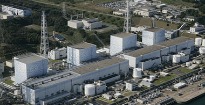Japan Fears Nuke Power Leak
 The Christian Science Monitor reports:
The Christian Science Monitor reports:
At least 11 of Japan's 52 nuclear power reactors are shut down and three of those may pose a danger to the public after a massive magnitude 8.9 earthquake hit the island nation Friday. One plant, 150 miles north of Tokyo, is reported to be in a state of emergency. It is relying on limited battery power to cool the three problematic reactors, and officials say they plan to release some radioactive gases to the atmosphere to cope with the problem.
The Japanese government issued an evacuation advisory to people living within a 3-kilometer (1.8-mile) radius of the Fukushima 1 nuclear power plant, according to Japan Broadcasting Corp.'s NHK World website.
Tokyo Electric Power Co. says an equipment failure had made it "impossible to cool two reactors" at the Fukushima 1 plant. Air that may contain radioactive materials will be vented from the plant, the company told NHK World late Friday. The decision to release the gases was to avoid the breakdown of the reactors, the news agency reported. Tokyo Electric told NHK World that the release would be small and that the company will notify residents near the plant before it starts the release and will monitor the amount of radioactivity in the gas.
The company reported that its power plant lacked sufficient electricity to cool the reactors, which automatically stopped operating when the quake struck, NHK World reported. Six reactors are inside Fukushima 1, and three were already offline prior to the quake.
But the quake knocked reactors 1, 2, and 3 offline. Then, about an hour after the quake, the diesel generators that provide emergency power for the cooling system on the reactors failed – putting the system on a battery backup system. Uncooled, a reactor's uranium core can overheat to the point of meltdown, and in a worst case become an event like the 1986 Chernobyl disaster in the Ukraine region of the former Soviet Union, which spread radiation across much of Europe.
Apparently in "a blackout condition," the plant is relying on a Reactor Core Isolation Cooling System backup, which needs batteries for valves, gauges, and instruments – and is reported to have about an eight-hour capacity, says Edwin Lyman, a nuclear specialist with the Union of Concerned Scientists in Washington.
At the time of writing, reactor pressure was said to be rising to dangerous levels inside the Fukushima plant's No. 1 reactor and might require venting [which would that release radiation], and water levels in reactor No. 2 were reported to be dropping [which causes the reactor to overheat], says Dr. Lyman. Failure of the cooling system can lead to a meltdown [of the reactor core], in which fire could release harmful levels of radioactivity into the environment.
Click here to read more.

